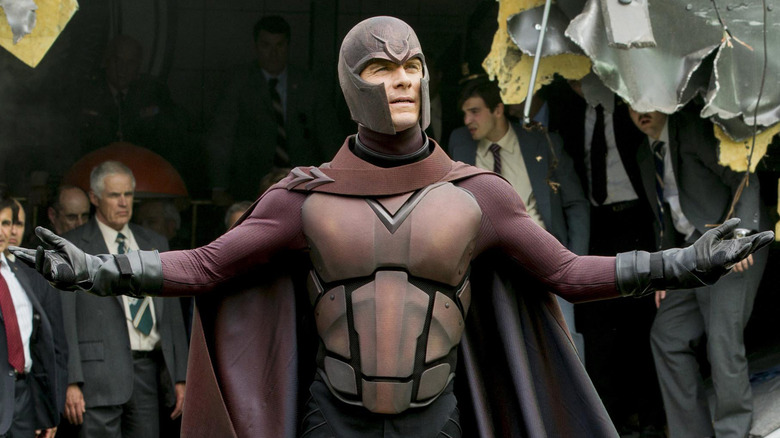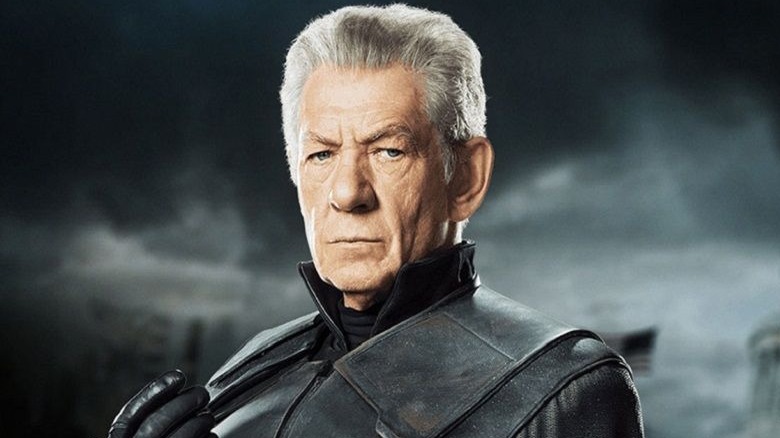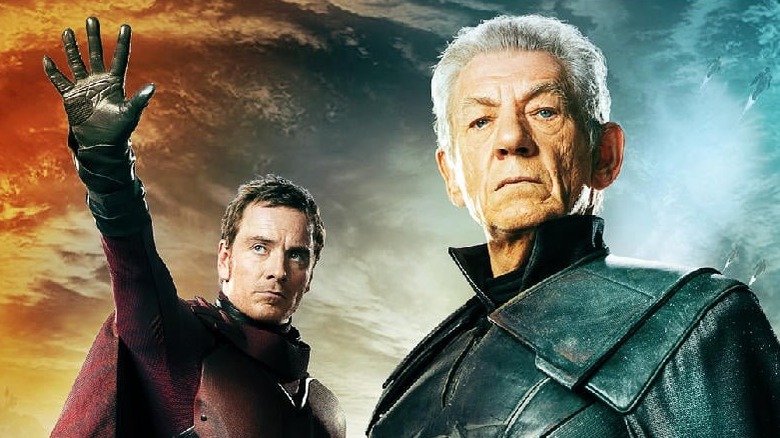X-Men: First Class Was Almost A Magneto Prequel Instead
I have a bit of a love/hate relationship with 20th Century Fox's "X-Men" film franchise. The "X-Men" comics contain some of my favorite superhero characters in history (most notably Kitty Pryde) and contain a wealth of material that would have been perfect on the silver screen. On the one hand, we've gotten great films including "X-Men: Days of Future Past" and "Logan," but on the other hand, there are films I'd love to have wiped from my memory Doctor Strange-style, especially "Dark Phoenix," which remains the perfect example of getting a second chance to do justice to a beloved story and completely botching it.
One of those aforementioned love/hate elements with the franchise is the fact that only a handful of mutants received the spotlight, despite the X-Men being one of the most vibrant and exciting ensembles in the comic book world. Though Wolverine was made the main star of the "X-Men" franchise, one of the characters who deserved more time in the sun is Erik Lensherr, better known as Magneto, who served as foe and circumstantial friend to the X-Men over the course of the franchise. In fact, the Master of Magnetism almost had his own solo film, but it soon evolved into the slick, snazzy "X-Men: First Class."
Magneto's not-so-secret origins
The genesis of the Magneto standalone movie occurred during the making of "X2: X-Men United," with David S. Goyer ("Batman Begins)" and Sheldon Turner ("The Longest Yard") tapped as writer and director respectively. The film was slated to focus on Magneto's youth and his liberation from Auschwitz — where he would have met a young Charles Xavier. Given that these events had been depicted briefly in the first "X-Men" film, it would have been amazing to see how Magneto went from a child to a man determined to protect mutantkind by any means necessary and how that fractured his friendship with Xavier.
Sadly, the film never came to be due to the poor reception of "X-Men Origins: Wolverine" — and I'm not surprised, seeing as how that film was a hot mess. Fox instead decided to develop a "X-Men: First Class" film using elements from Turner's "Magneto" script. Bryan Singer, the man behind the first two X-Men films, was approached to direct; Josh Schwartz was slated to write the script but ultimately departed as he and Singer had different ideas on where the script should go.
"I finished my draft. Bryan Singer came onboard the movie, who's the best possible guy to direct the X-Men movies, and he wanted to make a very different kind of movie. He's Bryan Singer. If he wants to make an X-Men movie, they make his X-Men movie. But it was a great experience and it was an honor to work on it."
Forging the first class of mutants
Singer dropped out of "First Class" due to a combination of disagreements with Turner (although they both receive a "Story By" credit in the final version) and taking up directorial duties on "Jack the Giant Slayer", which ended up flopping at the box office. In a 2009 interview, Singer revealed that pieces of the "Magneto" prequel did end up in his original "First Class" treatment.
"This story would probably utilize some of the Magneto story because it deals with a young Magneto, so it might supersede that because this would explore that relationship between a young energetic professor and a disenfranchised victim of the Holocaust."
Those pieces wound up in the final film, including Erik Lensherr's friendship with Charles Xavier. In fact, said friendship is a driving force of the film which makes it hurt all the more when Magneto ends up paralyzing Xavier.
Michael Fassbender was an excellent casting choice for the younger Magneto, as he captures the Master of Magnetism's fiery intensity, especially in the scene where he confronts a pair of Nazis in a bar. That sequence easily makes the "Top 10 Moments In Superhero Movie History" for me due to the rising tension and creative use of Magneto's superpowers. Lensherr says that he's Frankenstein's monster before he executes the last surviving Nazi, and it's an apt comparison; his relentless desire to protect mutantkind costs him multiple opportunities at a peaceful life throughout the film series. But like the man himself said, "Peace was never an option."


